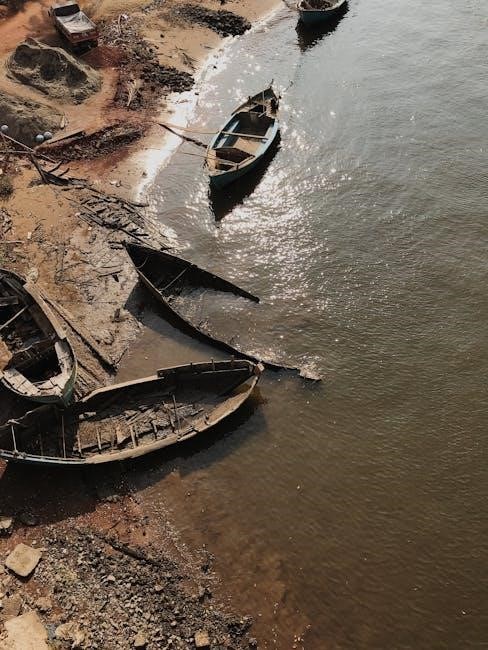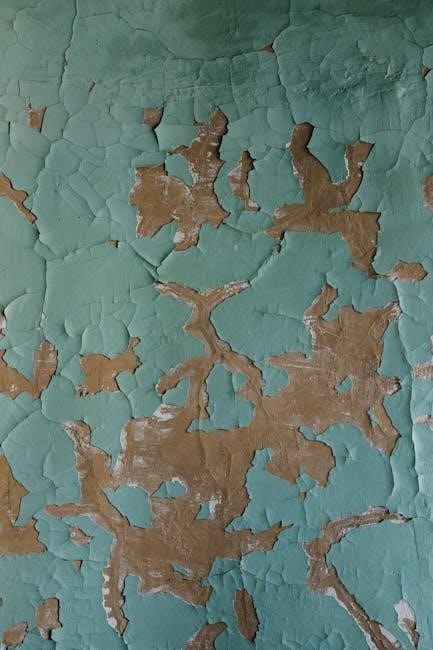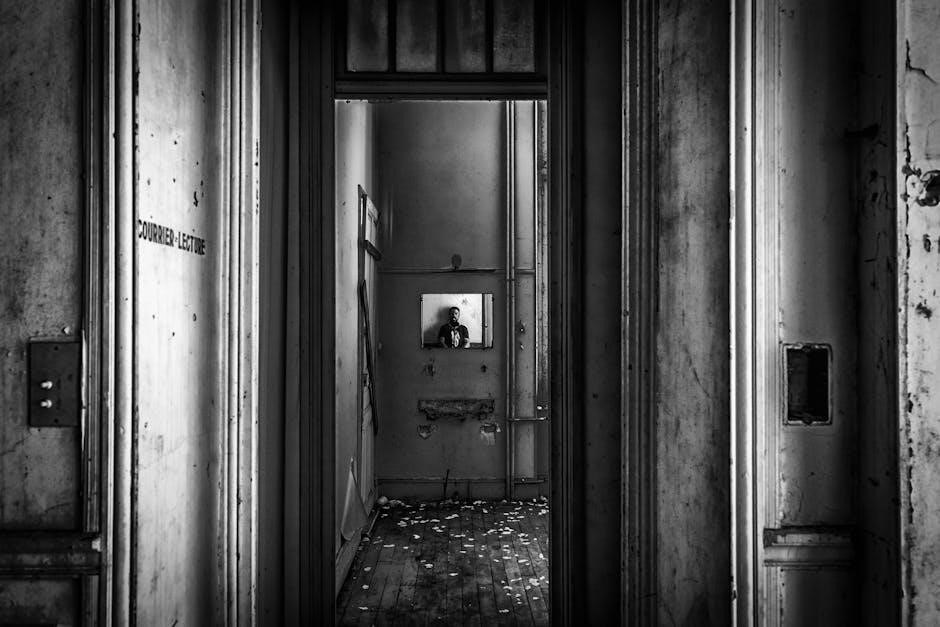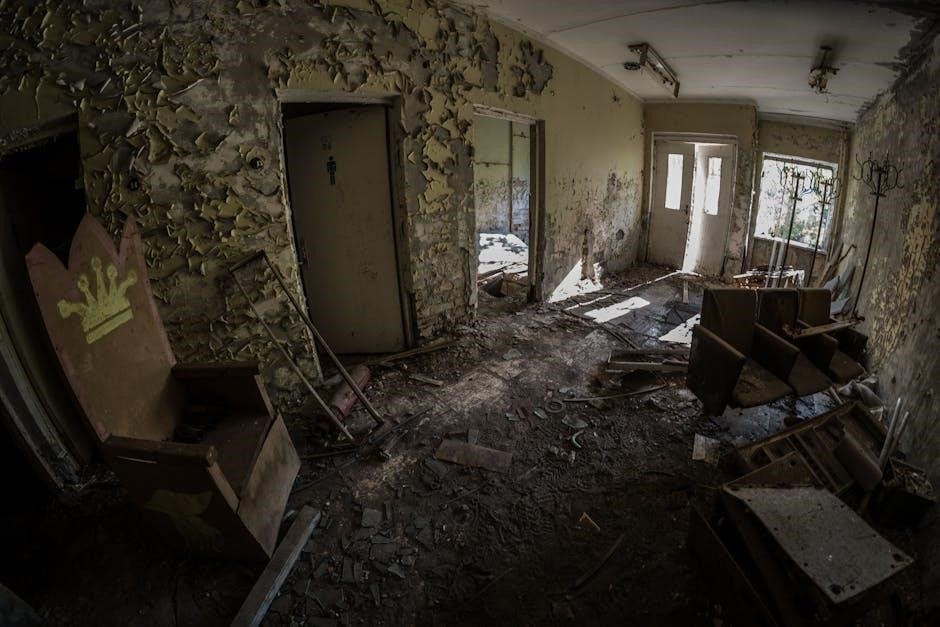Ruined, a Pulitzer Prize-winning play by Lynn Nottage, explores the devastating impact of war on women in the Democratic Republic of Congo. Set in a brothel run by Mama Nadi, the story delves into themes of survival, gender violence, and resilience, offering a haunting yet powerful portrayal of humanity amidst chaos.
1.1 Overview of the Play
Ruined by Lynn Nottage is a powerful drama set in a brothel during the Congolese civil war. The play explores themes of survival, resilience, and gender violence, offering a poignant portrayal of women’s lives amidst conflict. It is both a critique of war’s brutality and a celebration of human endurance, earning widespread acclaim and the Pulitzer Prize.
1.2 Historical Context and Setting
Ruined is set in the Democratic Republic of Congo during its brutal civil war. The play unfolds in a brothel owned by Mama Nadi, a place offering refuge and business amidst the conflict. This setting reflects the harsh realities of war and its impact on women, drawing from real-life events and testimonies.
1.3 Themes and Significance
Ruined delves into themes of survival, resilience, and gender violence, highlighting the plight of women in war-torn regions. It underscores the strength of women amidst atrocities, offering a poignant critique of societal structures and the human cost of conflict, resonating globally with its universal message of hope and defiance.

2.Plot and Characters

Plot and Characters
Ruined follows the lives of women in a brothel during the Democratic Republic of Congo’s civil war, focusing on their survival, relationships, and resilience amidst unimaginable brutality.
2.1 The Storyline and Main Plot
Ruined unfolds in a brothel run by Mama Nadi during the civil war in the Democratic Republic of Congo. The story centers on women like Salima and Sophie, survivors of sexual violence, struggling to rebuild their lives amidst the chaos. The plot explores their resilience, relationships, and the harsh realities of war.
2.2 Key Characters: Mama Nadi, Salima, Sophie, and Josephine
Mama Nadi, the pragmatic brothel owner, provides refuge while navigating war’s complexities. Salima, a rape survivor, struggles with trauma, while Sophie, mutilated by violence, embodies resilience. Josephine, Mama Nadi’s sharp-tongued assistant, adds depth, highlighting the women’s strength and vulnerability in a war-torn world.
2.3 Character Development and Relationships
Through their interactions, Mama Nadi’s protective instincts clash with her business acumen, while Salima and Sophie’s bond reflects shared trauma. Josephine’s loyalty to Mama Nadi contrasts with her own ambitions, illustrating the complex web of relationships shaped by survival, trust, and betrayal in a fractured society.

3.Themes in “Ruined”
Survival, resilience, and the struggle for hope are central themes, alongside the devastating impact of gender violence and the pursuit of redemption in a war-torn society.
3.1 Survival and Resilience
Survival and resilience are vividly portrayed through the women’s struggles in a war-torn Congo. Mama Nadi’s brothel serves as a refuge, where women navigate daily horrors through resourcefulness and emotional strength, highlighting the human capacity to endure amidst unimaginable brutality and find solace in shared resilience.
3.2 Gender Violence and War Crimes
Gender violence and war crimes are central to the play, depicting the brutal exploitation of women in the Congo; Rape, sexual slavery, and physical mutilation are weapons of war, leaving women with deep physical and emotional scars, while societal stigma further isolates them, highlighting the horrific reality of gender-based violence.
3.3 Hope and Redemption in the Midst of Chaos
Amidst the devastation, Ruined offers glimpses of hope and redemption. Through Mama Nadi’s complex character and the resilience of the women, the play illustrates the strength of the human spirit and the possibility of healing, even in the face of unimaginable suffering and destruction, providing a powerful message of enduring hope.

4.Historical and Cultural Context
Ruined is set in the Democratic Republic of Congo during its civil war. Mama Nadi’s bar serves as a refuge, reflecting the cultural and historical realities of war-torn regions, where such establishments often become complex spaces for survival and negotiation.
4.1 The Democratic Republic of Congo and Civil War
The Democratic Republic of Congo was plagued by a brutal civil war, causing widespread devastation and displacement. Ruined is set against this backdrop, highlighting the horrors of conflict and the resilience of women in a war-torn society, as depicted through Mama Nadi’s bar, a refuge amidst chaos.
4.2 The Impact of War on Women in the DRC
The civil war in the DRC had a devastating impact on women, who faced rape, torture, and displacement. Many were forced into sexual slavery, while others found resilience in survival. The play Ruined highlights their struggles and strength amidst unimaginable brutality and societal collapse.
4.3 The Role of Brothels as a Refuge
In Ruined, Mama Nadi’s brothel serves as a complex refuge for women. It offers safety from war’s brutality but also traps them in exploitation. The brothel becomes a sanctuary where survival is traded for dignity, reflecting the harsh choices women face in war-torn regions.
5.Lynn Nottage’s Background and Style
Lynn Nottage’s Background and Style
Lynn Nottage is a Pulitzer Prize-winning playwright known for exploring race, gender, and social justice. She studied at Brown University and Yale School of Drama, crafting poignant, socially conscious works like Intimate Apparel and Fabulation.
5.1 Biography of Lynn Nottage
Lynn Nottage is an American playwright born in Brooklyn, New York. She studied at Brown University and the Yale School of Drama, developing a passion for storytelling. Known for her socially conscious works, Nottage explores themes of race, gender, and systemic injustice, earning acclaim for plays like Ruined, Intimate Apparel, and Sweat.
5.2 Her Playwriting Style and Previous Works
Lynn Nottage’s playwriting style blends gritty realism with emotional depth, often addressing societal issues. Her works, like Intimate Apparel and Fabulation, explore themes of race, gender, and identity, showcasing her ability to craft compelling narratives that resonate deeply with audiences while shedding light on pressing social concerns.
5.3 The Inspiration Behind “Ruined”
Lynn Nottage drew inspiration from the devastating impact of the Democratic Republic of Congo’s civil war on women. Her visits to Africa and interviews with survivors of gender violence shaped the play’s themes of resilience and survival, offering a poignant reflection of humanity amidst conflict and oppression.
6.Awards and Recognition
Awards and Recognition
Ruined won the 2009 Pulitzer Prize for Drama, a testament to its powerful storytelling and social impact. This accolade solidified Lynn Nottage’s reputation as a leading playwright addressing global injustices.
6.1 The Pulitzer Prize for Drama (2009)
Ruined by Lynn Nottage received the prestigious 2009 Pulitzer Prize for Drama, acknowledging its profound portrayal of women’s survival during the Congolese civil war. This award highlighted the play’s emotional depth and its significant contribution to addressing gender violence and war’s impact, enhancing Nottage’s acclaim as a playwright.
6.2 Other Accolades and Nominations
Beyond the Pulitzer, Ruined earned the 2010 Steinberg Distinguished Playwright Award and widespread critical acclaim. Its European premiere at the Almeida Theatre in London was praised, solidifying its global impact. The play’s success underscores its relevance in sparking conversations about gender violence and social justice, further cementing its theatrical legacy.
6.2 Critical Acclaim and Reviews
Ruined received widespread critical acclaim for its raw emotional depth and unflinching portrayal of war’s impact on women. Critics praised its haunting yet hopeful narrative, calling it a “powerhouse drama” and a “shattering, intimate journey.” The play’s ability to balance brutality with humanity earned it a reputation as a masterpiece of contemporary theatre.

7.Download and Availability
Ruined by Lynn Nottage is available as a PDF download through platforms like Open Library and Theatre Communications Group. It can also be accessed in EPUB and Kindle formats for free or purchase, ensuring widespread availability for readers worldwide.
7.1 Where to Find the PDF Version
The PDF version of Ruined by Lynn Nottage is available for download on platforms like Open Library, PDFCoffee.com, and Theatre Communications Group. It can also be accessed through academic databases and online bookstores, offering both free and paid options for readers to obtain the play in digital format.
7.2 Legal and Free Download Options
Free and legal downloads of Ruined by Lynn Nottage are available through platforms like Open Library and PDFCoffee.com. These sites offer the play in PDF format, often requiring user registration. Ensure compliance with copyright laws and use the download for academic or personal purposes only.
7.3 Availability in Other Formats
Ruined by Lynn Nottage is available in various formats beyond PDF, including EPUB and Kindle. These formats are accessible on platforms like Amazon and Scribd, ensuring compatibility with e-readers and mobile devices for convenient reading and studying.
8.Staging and Performances

Staging and Performances
Ruined has been staged in notable productions worldwide, including its European premiere at the Almeida Theatre in London, directed by Liesl Tommy, highlighting its powerful impact and emotional resonance.
8.1 Notable Productions and Premieres
Ruined premiered at the Goodman Theatre and later at the Almeida Theatre in London, directed by Liesl Tommy. Its European premiere ran from April 15 to June 5, 2010, showcasing its powerful portrayal of war-torn Congo and earning international acclaim for its emotional depth and social relevance.
8.2 The European Premiere at the Almeida Theatre
Ruined made its European debut at Londons Almeida Theatre from April 15 to June 5, 2010. Directed by Liesl Tommy, the production brought Lynn Nottages powerful story to an international audience, highlighting the resilience of women in war-torn Congo and earning critical acclaim for its emotional depth and cultural significance.
8.3 Challenges in Staging the Play
Staging Ruined posed significant challenges, including depicting graphic violence and maintaining the emotional intensity of the characters’ journeys. The brothel setting required meticulous design to reflect both its refuge and business aspects, while the complex themes demanded sensitive handling to honor the stories of survivors and avoid exploitation.

9.Educational and Analytical Resources
Educational and Analytical Resources
Ruined is supported by study guides, critical essays, and discussion themes, offering deep insights into its themes and historical context. PDF versions and analyses are widely available online for educational purposes.
9.1 Study Guides and Analysis
Study guides for Ruined offer detailed analysis of themes, characters, and context. PDF versions are available online, providing comprehensive resources for understanding the play. They include discussion questions and insights, aiding academic exploration and enhancing comprehension of Nottage’s work and its historical significance.
9.2 Critical Essays and Reviews
Critical essays on Ruined provide in-depth analysis of its themes, characters, and historical context. Available in PDF formats, these essays explore the play’s portrayal of gender violence, resilience, and survival. Reviews highlight its Pulitzer Prize-winning significance, offering valuable insights into Lynn Nottage’s powerful storytelling and its impact on social awareness.
9.3 Discussion Questions and Themes
Discussion questions on Ruined focus on themes like survival, gender violence, and resilience. PDF resources explore the moral dilemmas faced by characters and the broader societal implications of war. These questions encourage readers to reflect on the play’s emotional depth and its relevance to global human rights issues.
10.The Cultural Impact of “Ruined”
Ruined has significantly raised awareness about gender violence and war crimes, sparking global conversations. Its unflinching portrayal of women’s struggles has made it a powerful tool for social advocacy and education.
10.1 Raising Awareness About Gender Violence
Ruined sheds light on the horrific realities of gender violence during the Congolese civil war. By portraying the brutal exploitation of women, the play sparks crucial conversations about sexual violence as a weapon of war, urging global action and advocacy for survivors.
10.2 The Play’s Role in Social Advocacy
Ruined serves as a powerful tool for social advocacy, amplifying the voices of women affected by war. By humanizing statistics and exposing atrocities, the play inspires global action, urging audiences to address gender violence and support survivors, fostering a call to action for justice and policy change.
10.3 Receptions Across Different Audiences
Ruined has garnered diverse receptions worldwide, resonating deeply with audiences for its unflinching portrayal of war’s impact on women. Critics praised its authenticity and emotional depth, while some noted its challenging nature. The play has sparked essential conversations, fostering empathy and raising awareness across cultures and demographics.

11.Conclusion
Ruined by Lynn Nottage is a powerful exploration of resilience, gender violence, and hope amidst war. Its Pulitzer Prize recognition underscores its lasting impact on theater and social awareness.
11.1 Summary of Key Points
Ruined by Lynn Nottage is a poignant drama that explores the resilience of women in the Democratic Republic of Congo during civil war. It highlights themes of survival, gender violence, and hope while shedding light on the brutal realities of war through powerful storytelling and complex characters.
11.2 The Lasting Legacy of “Ruined”
Ruined has left an indelible mark on theatre, earning the Pulitzer Prize and sparking global conversations about gender violence. Its unflinching portrayal of war’s impact on women has made it a cornerstone of social advocacy, inspiring awareness and fostering empathy through its powerful narrative and enduring cultural significance.
11.3 Final Thoughts on the Play’s Importance
Ruined remains a vital work, shedding light on the plight of women in war-torn regions. Its unflinching portrayal of resilience and brutality sparks crucial conversations about gender violence, making it a timeless advocate for social change and human dignity, ensuring its relevance for future generations.



